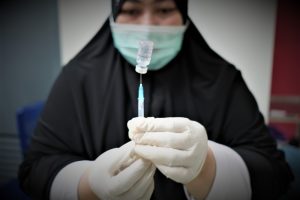The Indonesian government yesterday began rolling out COVID-19 booster shots for the general public, in an attempt to forestall fresh outbreak of the Omicron variant of the virus.
The Associated Press reported that the government hopes to administer 21 million booster shots this month, prioritizing the elderly and those with compromised immune systems. “This effort is important to increase the immunity of society, considering the COVID-19 virus keeps mutating,” President Joko “Jokowi” Widodo said on Tuesday.
On Monday, Indonesia’s Food and Drug Monitoring Agency announced that it had approved five COVID-19 vaccines – Sinovac, Pfizer, AstraZeneca, Moderna, and Zifivax – as booster shots for people who received their second doses at least six months ago. Several other vaccines are currently undergoing clinical trials to obtain emergency use permits.
Health Minister Budi Gunadi Sadikin said yesterday that the boosters will be administered as half doses in order to stretch Indonesia’s limited supplies of vaccines, after studies found that this stimulated sufficient antibody response.
The campaign reflects Indonesia’s determination to preempt the rapid spread of the Omicron variant, which is inflicting a growing toll on some of its Southeast Asian neighbors. The Philippines has already exceeded the peaks from last year’s crippling outbreak, recording the three consecutive days of record daily COVID-19 cases from January 8 to 10. Infections are also rising sharply in Thailand, which has now been forced to reintroduce a range of restrictions and suspend a quarantine-free tourism program for vaccinated travelers.
Indonesia has ample reason to worry. The country has recorded 4.2 million cases and more than 144,000 deaths since the beginning of the pandemic. While in per capita terms this is the fourth-lowest in Southeast Asia, last year’s severe outbreak overwhelmed the country’s healthcare system, especially in the capital Jakarta and elsewhere on the densely populated island of Java.
While the situation in Indonesia remains relatively stable, there, too, cases are beginning to creep upwards. On Tuesday, Indonesia recorded 802 new infections, the highest in almost three months, which was followed by a further 646 yesterday. Indeed, the emergence of the new variant in late November prompted the government’s decision to bring forward the start of the booster campaign, which was initially supposed to get underway once 70 percent of the eligible population had been vaccinated.
Initially, the Indonesian government proposed that people pay for their own booster shots, aside from the elderly and those without the means, but rightly came to the conclusion that charging for the booster was a recipe for vaccine hesitancy. “I have decided to provide the third dose free of charge to all Indonesians since people’s safety is crucial,” Jokowi said in a statement Tuesday. “Vaccination and discipline in adhering to the health protocols are key to overcoming the COVID-19 pandemic.”
In addition to its concerns about Omicron, the booster campaign reflects the Indonesian government’s policy of prioritizing the vaccination of the most densely populated, and hence most economically important, regions of the country. These include Jakarta and Bali, the epicenter of Indonesia’s tourism industry, both of which have now attained widespread vaccine coverage.
Meanwhile, only 42.4 percent of the country’s population have been double-vaxxed, and many other regions have struggled to obtain sufficient supply of vaccines. According to a recent report by Al Jazeera, which cited Ministry of Health data, outlying regions like Aceh and West Papua have managed to vaccinate only about 20 percent of their populations.
While the decision makes some sense, given the country’s limited supplies of vaccines, it runs the risk of runaway outbreaks in outlying regions given that the healthcare infrastructure in the less populated outlying islands remains much more vulnerable. Given this trade-off, it is perhaps understandable that the Indonesian government has been so outspoken about the perils of global vaccine inequity.

































